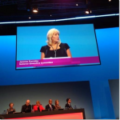A new settlement for workers – IER / CFTUF fringe at TUC Congress
Fringe meeting of TUC Congress on trade union freedom organised by the Institute of Employment Rights and the Campaign for Trade Union Freedom.
09 September 2014
By Jennie Formby, Unite political director
The first fringe meeting of this year’s TUC Congress on trade union freedom organised by the Institute of Employment Rights and the Campaign for Trade Union Freedom, was packed.
At a time of economic and political uncertainty, trade union freedom and sectoral collective bargaining has never been as important as it is now.
People have been battered by this Tory, Liberal Democrat coalition government. Ministers may rush to TV studios to assert that unemployment is coming down, that the economy is growing but these claims are a charade.
The vast majority of workers do not feel any benefit of this so-called economy recovery. And the reality of the unemployment figures is the use of zero hours and phoney self-employment. Strip away Tory hype and the story of the unemployment figures is the calamity of falling wages.
John Hendy QC told the meeting that collective bargaining restored living standards after the economic crash of 1929/30. Austerity measures have exacerbated the trend of rising inequality which in itself is a cause of economic crisis.
Hendy told the meeting that the coverage of collective bargaining (including wage councils) has declined from 80 per cent in the eighties to a derisory 20 per cent – that’s eight out of 10 workers who have their wages determined at the whim of employers.
Collective bargaining on its own is not enough it needs to be tied to sectoral bargaining otherwise there will be a race to the bottom. We are seeing a low wage economy here and in America.
Although John Hendy said he didn’t want to concentrate on Transatlantic Trade Investment Partnership (TTIP) he nevertheless warned the meeting of the danger of another trade deal, the Canada European Trade Agreement (CETA), being rushed through so that it can be signed at a summit in September.
Despite a consultation on ISDS in TTIP that attracted more than a hundred and fifty thousand responses, the EU Commission has not analysed comments and is instead using CETA as a means to embed the special courts of the ISDS.
“Lawyers”, Hendy argued, “will act as arbitrators while unions will be locked out.”
These trade deals are fundamentally undemocratic with power being transferred from nation states to multinationals who can sue if there is a hint of a ‘free trade barrier’.
“These trade deals must be resisted.” Hendy proclaimed.
In a barn-storming speech, Len McCluskey, general secretary of Unite, said that unions have a right to be respected: “It is a scandal that in the twenty first century people are scared to join a trade union”.
On the economy he said that trickle down has never worked and austerity isn’t working either. Even Germany is now going backwards. But he believed that the Labour programme would provide a new deal that will give people hope.
Len said that while the union has taken a position of neutrality in the Scottish referendum, what is happening in Scotland is an explosion of interest in politics with queues forming to register to vote. He said it was reminiscent of the scenes in South Africa following the collapse of apartheid when lines of black people wanting to vote.
“The ruling elite are happy with apathy”, Len told the meeting, “but we have to get the vote out. If we don’t it will be the end of the National Health Service.”
In a rallying call he said Labour has to enthuse our people to go out on the doorstep to return a Labour government.





